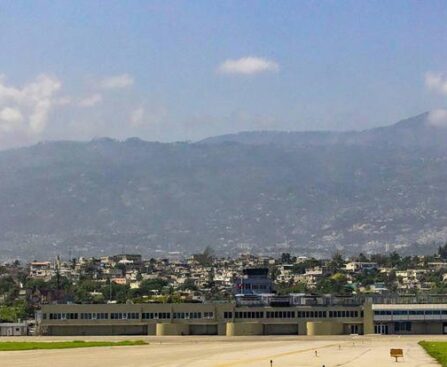Only days after Trump administration officials denied plans to transfer undocumented migrants to an American naval base in Guantánamo Bay, Cuba, before deporting them, a U.S. military plane flew 20 Haitians from the military installation to Port-au-Prince on Tuesday.While 11 of the migrants who landed back in Haiti’s gang-controlled capital had been picked up at sea near The Bahamas while reportedly en route to Florida, nine others had been transferred to Guantánamo from Immigration and Customs Enforcement detention in the United States, two sources told the Miami Herald.“Some said they had been in two [detention] facilities in a week,” a Haitian official told the Miami Herald after confirming the U.S. military flight’s quiet arrival in the Caribbean nation.The aircraft landed at 12:05 p.m. Tuesday at Toussaint Louverture International Airport in Haiti’s capital, where armed gangs control most of the roads in the surrounding area and the metropolitan area was plunged into blackout hours later after the main Péligre hydroelectric power plant was forced to shut down by protests. Deemed too dangerous for U.S. citizens, the airport has been off limits to U.S. commercial and cargo flights since November, when gangs opened fire on Spirit Airlines and also hit JetBlue Airways and American Airlines with bullets, forcing the Federal Aviation Administration to issue an ongoing ban.The Trump administration has scheduled the repatriation of another 61 Haitians back to the country on Wednesday. That flight is going to land in Cap-Haïtien, according to a source with knowledge of the plans.With the only international airport accessible to the outside world, Cap-Haïtien has received an average of one U.S. deportation flight a month. Tens of thousands of Haitians have also been deported home from the neighboring Dominican Republic.The Department of Homeland Security did not respond to Miami Herald questions about why the Haitian migrants were transferred from the United States to the naval base in Cuba.Last week, White House Press Secretary Karoline Leavitt labeled reports that the administration planned to send thousands of migrants, including nationals from Western European countries, to the controversial detention facility at Guantánamo Bay as “fake news.”“Not happening,” Leavitt posted on X.Guantánamo Bay, which has a prison for suspected terrorists tied to the Sept. 11, 2001, attacks, has long had a facility to house migrants, mostly Cubans and Haitians picked up at sea while their asylum claims are heard or they are resettled in a third country. But one of President Donald Trump’s first official acts upon returning to the White House earlier this year was ordering officials to prepare Guantánamo to hold as many as 30,000 migrants.Trump’s directive marked a dramatic expansion of the facility’s use for immigration enforcement as part of his mass deportation campaign. In February, the administration sent more than 150 Venezuelans to Guantánamo before deporting them back to their home country. At the time, advocates and lawyers raised alarms that jailing them there was inhumane and violated the immigrants’ constitutional rights.The following month, an undisclosed number of migrants at the facility were then transferred to a detention center in Louisiana.In recent weeks, top White House adviser Stephen Miller has put pressure on immigration officials to ramp up immigrant detentions to 3,000 a day —a goal that is likely to overcrowd already full detention centers.Guerline Jozef, executive director of the San Diego-based Haitian Bridge Alliance, said the transfer of Haitian nationals to Guantánamo Bay was “covert” and their deportation from the base “is not just a humanitarian crisis. It is a flagrant violation of international human rights and civil liberties.“Guantánamo is a black site designed for secrecy and exclusion. Haitian immigrants—and asylum seekers—are once again being subjected to the same cruel, barbaric and inhumane treatment they were subjected in the 1990s, held without access to counsel, without notice to their families or legal advocates and deported under the cover of darkness,” Jozef said. “These individuals have been stripped of their most basic rights under U.S. and international law.”Jozef, who lobbied against such a plan during the Biden administration and denounced the Trump administration’s directive in January, said she and other advocates “are deeply familiar with Guantánamo protocols. This is not how immigration detention is supposed to work. The decision to disappear Haitians and others into this military pipeline reveals the racialized logic of U.S. immigration enforcement. We cannot allow a system built for indefinite detention and torture to become the new front line of migrant removal. This is a human rights emergency and a moral disgrace.”For Haitians, the infamous military base in Cuba has a troubled history. About 34,000 Haitians were detained at the base in the early 1990s after the Haitian military led a coup against the country’s democratically elected president, Jean-Bertrand Aristide. The Haitians were detained at sea by the U.S. Coast Guard while trying to reach Florida in makeshift boats. At the base, they were held behind barbed wire fencing where, along with similarly detained Cuban refugees, they were subjected to inhumane conditions.The base was finally ordered closed in 1993 after a federal court ruling found that the government had unlawfully held migrants at the offshore detention center. Despite the court order, the U.S. maintained its right to hold refugees at the base and has long operated a migrant facility there where individuals picked up at sea and who claim fear of persecution in their home countries are taken for interviews.©2025 Miami Herald. Visit miamiherald.com. Distributed by Tribune Content Agency, LLC.
Story Continues
© Copyright 2025 Miami Herald. All rights reserved. This material may not be published, broadcast, rewritten or redistributed.

